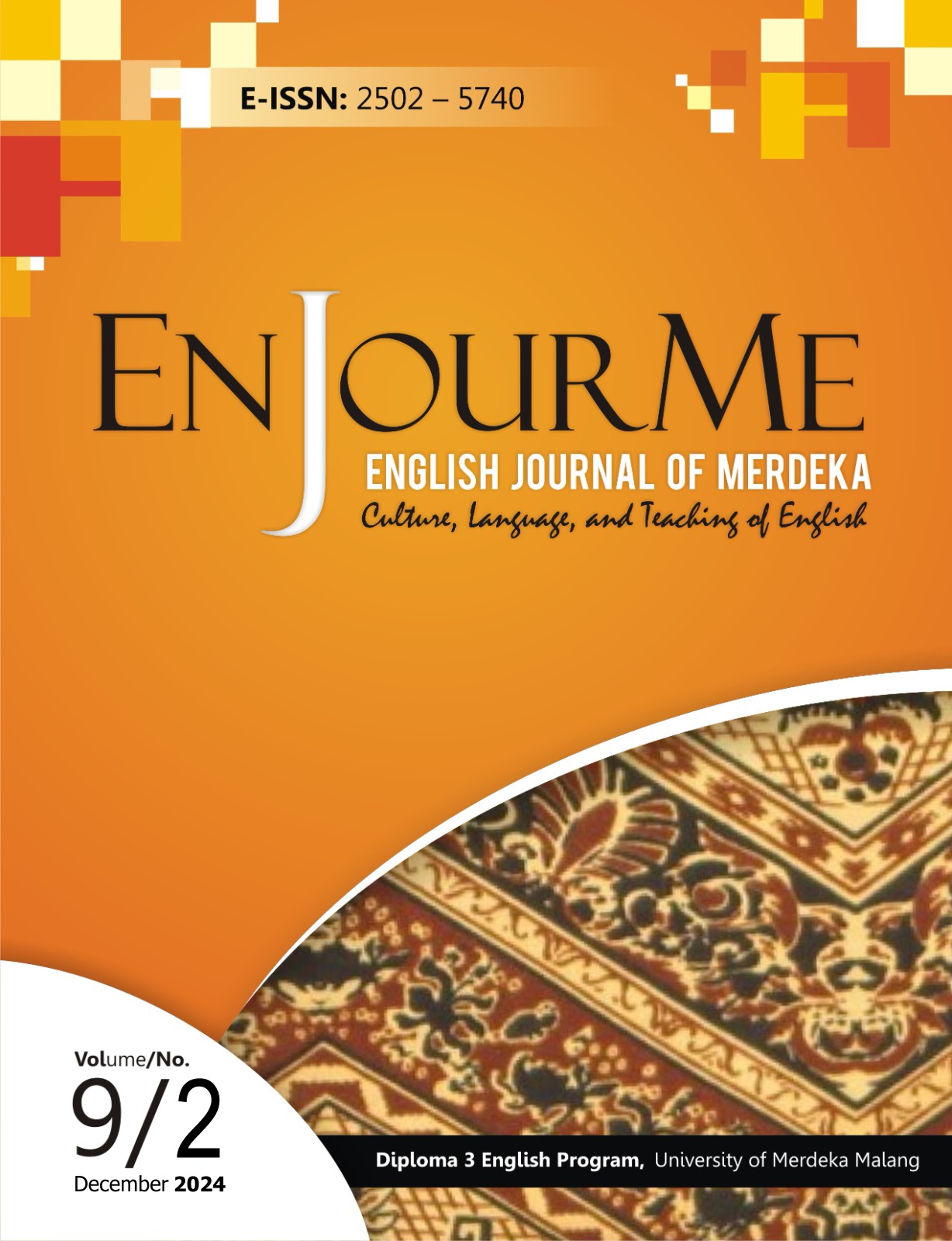Beyond language proficiency: integrating soft skills into Business English teaching
Keywords:
Business english, integration, soft skillsAbstract
Teaching Business English extends beyond mastering vocabulary and grammar; it equips learners with the skills to communicate effectively in professional environ-ments. In busines world, soft skills such as communication, teamwork, problem-
solving, and negotiation are equally important as linguistic proficiency. This article
examines effective methodologies for integrating soft skills into Business English
teaching by reviewing relevant literature and case studies published between 2019
and 2024. The findings highlight the urgency of incorporating soft skills into the
curriculum to enhance learners’ ability to navigate real-world business contexts.
Several practical methodologies, such as project-based learning, role-playing, and
case study analysis, are recommended to support this integration. This discussion
provides valuable insights for curriculum designers, educators, and learners, help-
ing them optimize their roles in fostering comprehensive Business English educa-
tion.
Downloads
References
Andrievskikh, S., & Lapina, V. (2021). Integrating soft skills development into English language class.
SHS Web of Conferences, 99, 01026. https://doi.org/10.1051/shsconf/20219901026
Banerjee, D., & Roy, A. (2021). Learner Centred methods of Business English Learning. International
Journal of English Learning & Teaching Skills, 3(2), 2111–2122.
Bovée, L., & Thill, J. V. (2021). Business Communication Today Chairman and Chief Executive Officer
Global Communication Strategies. https://support.pearson.com/getsupport/s/contactsupport
Diachkova, Y., Sazhko, L., Shevchenko, L., & Syzenko, A. (2021). Global Issues in ESP Classroom: Chal-
lenges and Opportunities in Higher Education. Arab World English Journal, 12(1), 388–400. https://doi.org/10.24093/awej/vol12no1.26
Farani, Y., & Yustisia, K. K. (2021). DEVELOPING SPEAKING SECTION OF BUSINESS ENGLISH MATERIALS
GUELLIL, A. (2020). The Role of Culture in Teaching English for Business Purposes. International Journal
of English Literature and Social Sciences, 5(5), 1626–1630. https://doi.org/10.22161/ijels.55.43
Hamma, R., & Hajar Larekeng, S. (2024). THE IMPACT OF LITERATURE IN ENGLISH LANGUAGE TEACHING-CHALLENGES AND OPPORTUNITIES: A LITERATURE REVIEW. Klasikal: Journal of Education, Language Teaching and Science, 6.
Hartati, L., Marsono, & Yoto. (2022). The effect of the project-based learning model on the soft skill of
vocational school students. Technium Social Sciences Journal, 27(27), 180–193.http://dx.doi.org/10.47577/tssj.v27i1.5569
Herbert, N., & Herbert, D. (2020). Five Principles to Integrate Professional Skill Development within a Curriculum to Ensure Industry-Ready Graduates. ACIS 2020 Proceedings. https://aisel.aisnet.org/acis2020
HOREA, I. C., & ABRUDAN, C. L. (2022). COMMUNICATION SKILLS IN BUSINESS ENGLISH. The Annals of the University of Oradea. Economic Sciences, 31(31(1)). https://doi.org/10.47535/1991auoes31(1)029
Ãpek, Z. H., Gözüm, A. Ã. C., Papadakis, S., & Kallogiannakis, M. (2023). Educational Applications of the ChatGPT AI System: A Systematic Review Research. Educational Process: International Journal,
(3), 26–55. https://doi.org/10.22521/edupij.2023.123.2
Khan, U., Zaki, S. A., Abu Rehan, Adam, M., & Ahmad, S. (2021). Examining the Significance of General
Liu, W. (2022). A Study on the Integration of Business English Teaching and Intercultural Communication Skills Cultivation Model Based on Intelligent Algorithm. Security and Communication Networks, 2022. https://doi.org/10.1155/2022/2873802
Maulana, N. (2023). TOWARD SUSTAINABLE HIGHER EDUCATION: INTEGRATING SOFT SKILL DEVELOPMENT INTO BUSINESS SCHOOL CURRICULUM IN INDONESIA. Journal of Law and Sustainable Development, 11(4). https://doi.org/10.55908/sdgs.v11i4.325
Mercedes, Q. J., & RamÃrez, J. D. (2021). The development soft skills and communication in English in engineering students. DIGILEC: Revista Internacional de Lenguas y Culturas, 8. https://doi.org/
17979/digilec.2021.8.0.7763
Ngo, T. T. A. (2024). The Importance of Soft Skills for Academic Performance and Career Development From the Perspective of University Students. International Journal of Engineering Pedagogy, 14(3), 53–68. https://doi.org/10.3991/ijep.v14i3.45425
Roshid, M. M., & Kankaanranta, A. (2023). English Communication Skills in International Business: Industry Expectations Versus University Preparation. Business and Professional Communication Quarterly. https://doi.org/10.1177/23294906231184814
Ruminar, H. (2024). Development of Soft Skills in Teaching English to Agriculture Students. Journey: Journal of English Language and Pedagogy, 7(1), 14–28. https://doi.org/10.33503/journey.v7i1.3808
Sofyan, M. (2019). Student Perception of ESP Business English Teaching Implementation in Makassar National Informatics Polytechnic. http://ojs.unm.ac.id/index.php/administrare/index
Soproni, Z. (2023). Employability Skills. GiLE Journal of Skills Development, 3(2), 53–65. https://doi.org/10.52398/gjsd.2023.v3.i2.pp53-65
Spivak, V. V. (2024). «SOFT SKILLS» IN THE PROFESSIONAL ACTIVITIES OF EMPLOYEES OF THE STATE
PENITENTIARY SERVICE OF UKRAINE. Scientific Herald of Sivershchyna. Series: Education. Social and Behavioural Sciences, 2024(2), 209–219. https://doi.org/10.32755/sjeducation.2024.02.209
Suratno, S., & Hutabarat, Z. S. (2023). Assessment of Soft Skill Learning Model Instruments in Interpersonal Relations of Economic Education Students. AL-ISHLAH: Jurnal Pendidikan, 15(3). https://doi.org/10.35445/alishlah.v15i3.1678
Suryaningsih, V. (2021). Strengthening Student Engagement: How Student Hone Their Soft Skill Along
Online Learning During Covid-19 Pandemic? Jurnal Manajemen Bisnis, 18(1). https://doi.org/10.38043/jmb.v18i1.2806
Ulfa, Z. M., & Rosidin, U. (2024). Development of Instrument Soft Skill Assessment in Problem-Based Learning to Improve Students’ Collaboration Skills, Communication Skills, and Social Skills.
Jurnal Penelitian Pendidikan IPA, 10(7), 3681–3688. https://doi.org/10.29303/jppipa.v10i7.7545 View of Vocational University Teacher’s Beliefs Upon Business English as a Lingua Franca. (n.d.).
Vo, T. H. Le. (2022). Online simulated workplace tasks to enhance business English learning. Journal of Asian Business and Economic Studies, 29(3), 205–221. https://doi.org/10.1108/JABES-06-20200058
Wu, Y., Xu, L., & Philbin, S. P. (2023). Evaluating the Role of the Communication Skills of Engineering Students on Employability According to the Outcome-Based Education (OBE) Theory.Sustainability (Switzerland), 15(12). https://doi.org/10.3390/su15129711
Xie, Q. (2022). Applying Problem-Based Approach in Business English Courses for China’s English
Majors. SAGE Open, 12(2). https://doi.org/10.1177/21582440221093349
Yao, C. W., & Tuliao, M. D. (2019). Soft skill development for employability. Higher Education, Skills and Work-Based Learning, 9(3). https://doi.org/10.1108/heswbl-03-2018-0027
Zhong, M. (2024). Integrating critical thinking into task-based teaching of an integrated course of advanced business English. SHS Web of Conferences, 190, 01022. https://doi.org/10.1051/shsconf/202419001022
Additional Files
Published
How to Cite
Issue
Section
License
Authors who publish with this journal agree to the following terms:
(1) Copyright of the published articles will be transferred to the journal as the publisher of the manuscripts. Therefore, the author confirms that the copyright has been managed by the journal.
(2) Publisher of EnJourMe (English Journal of Merdeka) : Culture, Language, and Teaching of English is University of Merdeka Malang.
(3) The copyright follows Creative Commons Attribution–ShareAlike License (CC BY SA): This license allows to Share — copy and redistribute the material in any medium or format, Adapt — remix, transform, and build upon the material, for any purpose, even commercially.




